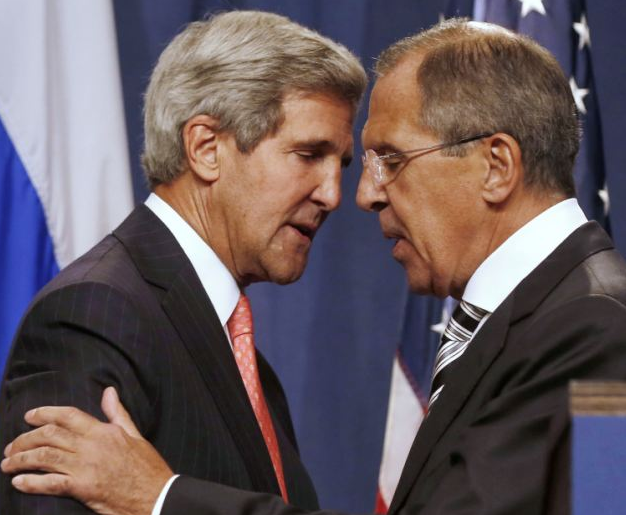US, Russia reach deal on Syria
 0 Comment(s)
0 Comment(s) Print
Print E-mail China.org.cn, September 15, 2013
E-mail China.org.cn, September 15, 2013
|
|
|
Agreement: U.S. Secretary of State John Kerry, left, and Russian Foreign Minister Sergei Lavrov, shake hands yesterday after making a deal over Syria following three days of negotiations |
Kerry made the remarks at a joint press conference after talks with Russian Foreign Minister Sergei Lavrov following their three-day negotiations in Geneva.
According to the framework, Syria must submit a "comprehensive listing" of its chemical weapons stockpiles within one week.
The listing should include names, types and quantities of its chemical weapons agents, types of munitions, and location and form of storage, production, and research and development facilities.
They also agreed to use extraordinary procedures under the Chemical Weapons Convention for the destruction and verification of Syrian chemical weapons, he said.
Syria must provide the Organization for the Prohibition of Chemical Weapons (OPCW) and supporting personnel with "an immediate and unfettered right to inspect any and all sites in Syria", he stressed.
Kerry said the inspectors must be on the ground by November and destruction or removal of the chemical weapons must be completed by mid-2014.
"We have committed to a standard that says, verify and verify," he said.
Kerry said that the two sides agreed that the most effective control of these weapons may be achieved by removal of the largest amounts of weapons feasible, under the supervision of the OPCW, and their destruction outside of Syria.
"In the event of non-compliance, we have committed to impose measures under Chapter 7 within UN Security Council," Kerry said, referring to the authorization of both military and non-military sanctions.
Lavrov said the framework was based on consensus, compromise and professionalism.
"We have achieved an aim that we had in front of us... to put under control the arsenal of chemical weapons in Syria," he said.
He stressed that the main responsibility of ensuring of the safety of the inspectors would be up to the Syrian authorities, but other parties, the opposition, should also not create threats to international personnel.
Timetable for Syrian chemical weapons will be set after the United Nations chemical weapons body's approval, Lavrov said, adding that the deal said nothing about use of force, nor any automatic sanctions.
"All violations should be approved in the Security Council," he said.
Kerry said the success of the implementation of the framework would lay the ground work for further cooperation to end the more than two-year bloodshed in Syria.
"What we agreed on today could conceivably be the first critical concrete step in that direction. The United States and Russia have long agreed that there is no military solution to the conflict in Syria. It has to be political," he said.
"The combination of the threat of force and willingness to pursue diplomacy helped to bring us to this moment," Kerry said.
He said the implementation of the framework presents a "hard road ahead".
"The world will now expect the Assad regime to live up to its public commitments. There going to be no games, no room for avoidance or anything less than full compliance by the Assad regime," Kerry stressed.
Lavrov also said the decision they have reached today is only the beginning of the road.
They started the crucial talks Thursday evening on Russia's proposal to put Syria's chemical weapons under international control.
During their intensive talks, Kerry and Lavrov met with the UN-Arab League Joint Special Representative for Syria Lakhdar Brahimi on convening international peace talks on Syria, dubbed "Geneva 2".
The two agreed to meet again with Brahimi on the margin of the UN General Assembly in New York around September 28.
Kerry said at Saturday's press conference that the meeting would help advance the two linked parallel efforts.
"Foreign Minster Lavrov and I have been long talking about the importance of creating the conditions for a political settlement that implements the Geneva 1 communique," he said.
Lavrov said Russia wanted to make sure that all parties to be present at the Geneva 2 conference without preliminary conditions and the Syrians should decide their fate by their own.




 Add your comments...
Add your comments...

